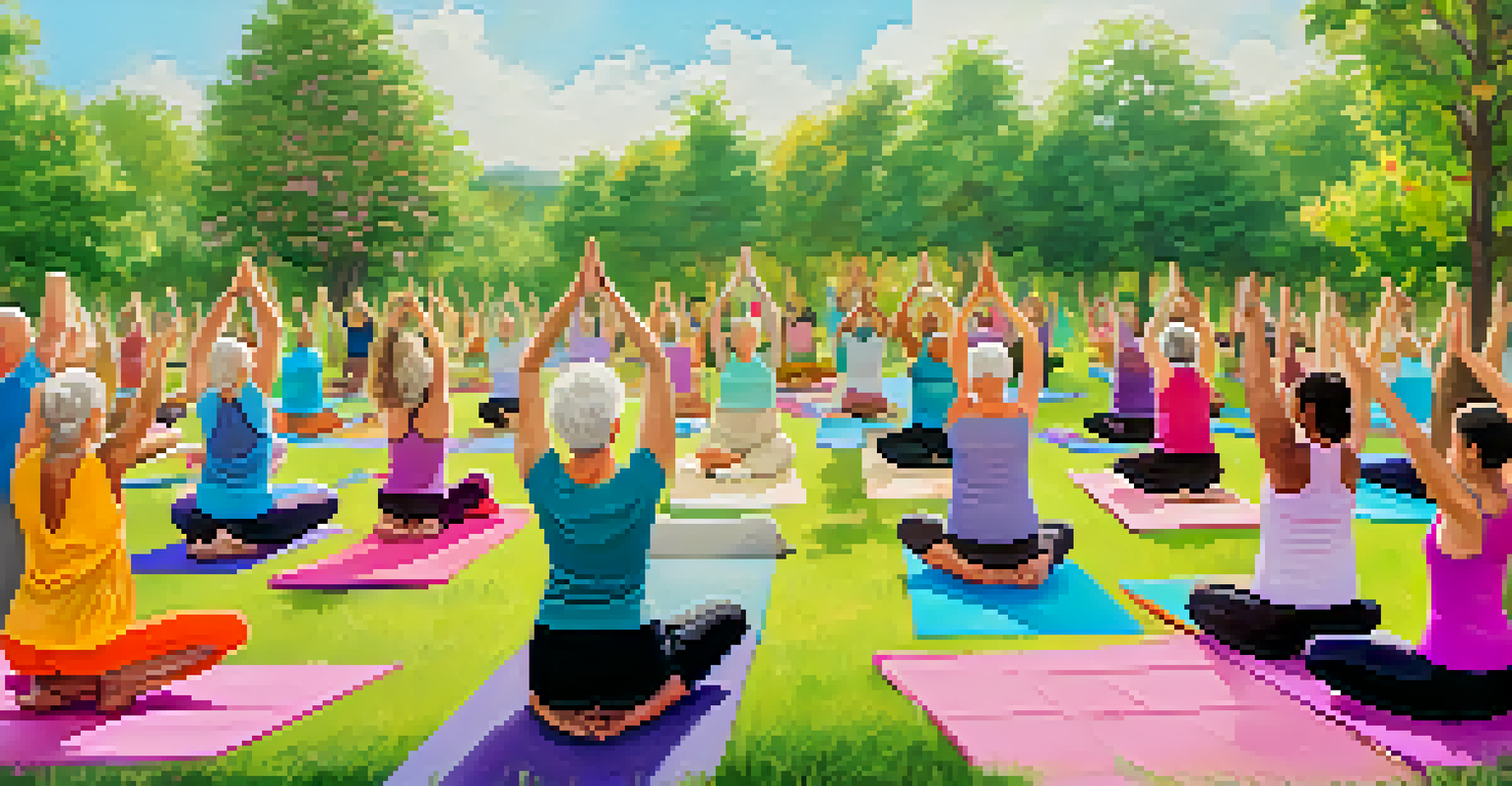The Role of Wellness Coaches in Supporting Active Aging

Understanding Active Aging: What Does It Mean?
Active aging refers to the process of optimizing opportunities for health, participation, and security to enhance quality of life as people age. It encourages individuals to stay socially, physically, and mentally engaged, which can significantly improve overall well-being. This concept is not just about remaining physically active, but also about maintaining a vibrant social life and engaging in continuous learning.
Aging is not lost youth but a new stage of opportunity and strength.
As we age, it’s easy to fall into routines that may not support an active lifestyle. However, active aging empowers individuals to take control of their health and happiness, making it vital to understand its importance. When seniors embrace this philosophy, they can enjoy a richer, more fulfilling life, making every moment count.
This is where wellness coaches come into play, offering guidance and support tailored specifically to the needs of older adults. They help individuals set realistic goals, encouraging them to engage in activities that foster both mental and physical health.
The Role of Wellness Coaches in Promoting Health
Wellness coaches are trained professionals who guide clients in making healthier lifestyle choices. They work with individuals to create personalized plans that encompass nutrition, exercise, and mental wellness. For seniors, having a coach can mean the difference between feeling overwhelmed by health changes and feeling empowered to tackle them.

By offering support and accountability, wellness coaches help seniors navigate the complexities of aging. They can provide motivation to stay active, suggest new activities, and adapt routines to suit their clients’ capabilities. This ongoing support can foster a sense of community and belonging, something that is incredibly important as we grow older.
Active Aging Enhances Quality of Life
Active aging emphasizes the importance of maintaining physical, mental, and social engagement to improve overall well-being as individuals grow older.
Moreover, wellness coaches can educate seniors about the benefits of various activities, helping them understand why certain practices, like regular exercise or mindfulness, are crucial at their age. This education paves the way for informed decision-making, enabling seniors to embrace a healthier lifestyle.
Creating Personalized Wellness Plans
One of the key contributions of wellness coaches is their ability to create personalized wellness plans tailored to each individual's unique needs and goals. They take into consideration factors such as physical limitations, health conditions, and personal interests. This customization ensures that the plan is not only effective but also enjoyable.
The greatest discovery of all time is that a person can change his future by merely changing his attitude.
For instance, if a senior enjoys gardening, a wellness coach might incorporate light gardening activities into their fitness routine. By aligning wellness goals with personal interests, seniors are more likely to stay engaged and motivated. This approach fosters a sense of accomplishment and satisfaction.
These personalized plans also include regular assessments and adjustments, allowing seniors to celebrate progress and refine goals over time. This ongoing adaptation keeps the journey fresh and aligned with the evolving needs of the individual.
Encouraging Social Engagement and Community
Wellness coaches understand that social interaction plays a critical role in active aging. They often encourage clients to participate in community events, classes, or group activities. This social engagement not only combats feelings of loneliness but also enhances overall well-being.
For example, a wellness coach might suggest joining a local walking group or participating in community yoga classes. These activities provide not only physical benefits but also opportunities to connect with peers, fostering friendships and support networks. These connections can be vital for emotional health.
Wellness Coaches Personalize Support
Wellness coaches create tailored wellness plans that cater to the unique needs and preferences of seniors, ensuring a more enjoyable and effective approach to health.
Furthermore, wellness coaches can organize group challenges or activities that promote camaraderie and motivation among participants. This sense of community can create lasting bonds, making the journey towards health a shared experience rather than a solitary one.
Mental Wellness: A Core Component of Active Aging
While physical health is often highlighted, mental wellness is equally important in the discussion of active aging. Wellness coaches emphasize the significance of mental health by incorporating stress management techniques, mindfulness practices, and creative outlets into their clients’ routines. This holistic approach ensures that seniors are supported in all aspects of their well-being.
Activities such as meditation, journaling, and even art classes can be beneficial for mental health. Wellness coaches help seniors explore these options, encouraging them to find what resonates best. By prioritizing mental wellness, seniors can enhance their emotional resilience and overall quality of life.
Moreover, wellness coaches can provide strategies to cope with the challenges that come with aging, such as loss or changes in social roles. By fostering mental wellness, they empower seniors to maintain a positive outlook and actively engage with life.
Overcoming Barriers to Active Aging
Seniors often face various barriers that may hinder their ability to engage in an active lifestyle, such as mobility issues, health conditions, or lack of motivation. Wellness coaches play a crucial role in identifying these barriers and developing strategies to overcome them. By addressing these challenges head-on, they help seniors build confidence in their abilities.
For example, if a senior has mobility challenges, a wellness coach might suggest alternative exercises that can be done seated or with the aid of assistive devices. This adaptability makes physical activity more accessible and less intimidating. It’s about finding ways to keep moving, regardless of limitations.
Social Engagement Boosts Well-Being
Encouraging social interactions through community activities helps combat loneliness and fosters emotional health among seniors.
Additionally, wellness coaches can provide encouragement and support to counteract feelings of discouragement. By celebrating small victories and progress, they help seniors stay motivated and engaged in their wellness journey.
The Future of Wellness Coaching for Seniors
As the population of older adults continues to grow, the demand for wellness coaches specializing in active aging is likely to increase. This trend reflects a growing recognition of the importance of holistic health and wellness for seniors. Wellness coaching is evolving, incorporating new research and techniques to better serve this demographic.
The future may also see more technology-assisted wellness coaching, such as virtual sessions and online resources, making coaching even more accessible. This shift could help bridge the gap for seniors who may have difficulty traveling or who prefer the comfort of their own homes.

Ultimately, wellness coaches will continue to play a pivotal role in supporting seniors on their journey towards active aging, promoting not only physical health but also social connections and mental well-being. Their guidance can lead to happier, healthier lives for older adults, proving that age is just a number.